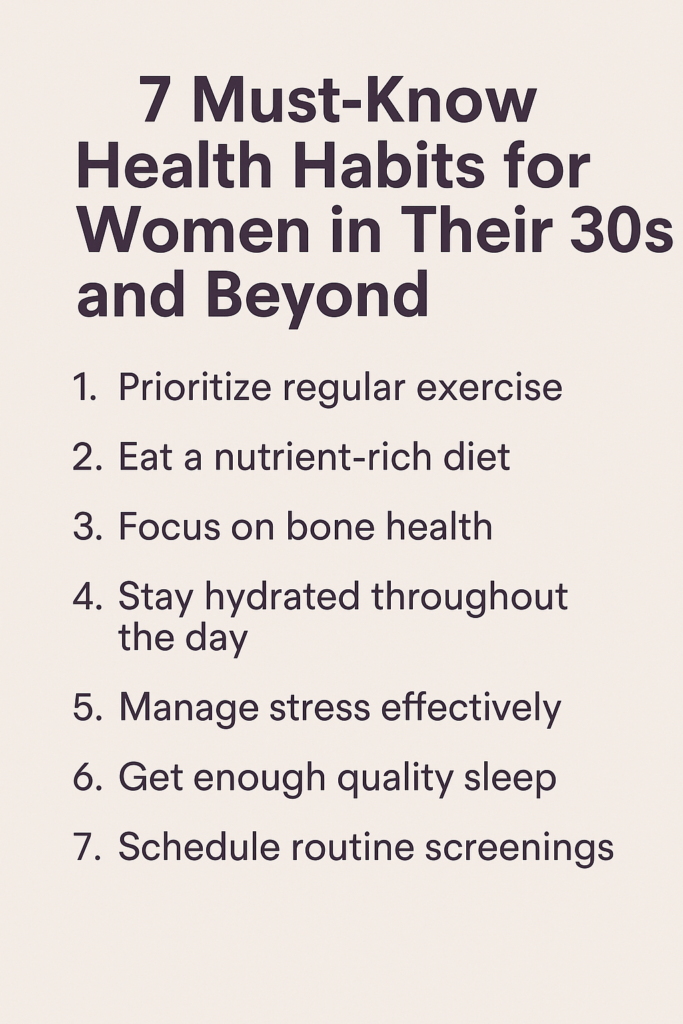Do you often feel tired no matter how much you rest? As a woman, are your periods irregular, your hair falling more than usual, or your mood swinging without warning?
These aren’t just random issues—they’re your body’s way of asking for attention. Many woman juggle responsibilities daily, often ignoring signs that their health needs care.
Fatigue, hormonal changes, and emotional ups and downs can point to deeper imbalances like nutritional deficiencies, stress, or thyroid issues. Understanding these symptoms early helps every woman take charge of her well-being. It’s time to slow down, tune in, and truly listen—because as a woman, your body is always speaking. Are you paying attention?
Turning 30 is a pivotal time in a woman’s life, where changes start to happen – both physically and emotionally.
It’s important to focus on maintaining a balanced, healthy lifestyle to ensure vitality and well-being. Here are 7 essential health tips that every woman should follow after 30 to feel great and stay strong:
Table of Contents
1.Nourish Your Body with the Right Diet
- Prioritize Whole Foods
Include fresh fruits, vegetables, whole grains, nuts, and seeds in your daily meals. These provide essential vitamins, minerals, and antioxidants that support overall health and protect against diseases. - Focus on Iron and Calcium Intake
Women are more prone to iron deficiency and bone-related issues. Add iron-rich foods like leafy greens, lentils, and dates, and calcium sources like dairy products, ragi, sesame seeds, and tofu to keep your blood and bones strong. - Stay Hydrated and Limit Processed Foods
Drink plenty of water throughout the day and reduce your intake of processed snacks, sugary drinks, and fast food. These can affect hormonal balance, energy levels, and skin health. - Eat According to Your Life Stage
Nutritional needs change during menstruation, pregnancy, breastfeeding, and menopause. Tailor your diet accordingly—include folic acid during pregnancy, and boost protein and omega-3 intake during menopause for hormonal support
2.Stay Hydrated and Prioritize Sleep
- Hydration Boosts Energy and Digestion
Drinking enough water throughout the day helps maintain energy levels, supports digestion, and keeps your skin glowing. Aim for 2–3 liters daily, and add herbal teas or coconut water for variety. - Sleep Regulates Hormones and Mood
A good night’s sleep (7–8 hours) helps balance hormones, reduces stress, and improves emotional well-being. Lack of sleep can lead to weight gain, fatigue, and mood swings. - Create a Calm Night Routine
Wind down with light stretching, reading, or meditation before bed. Avoid screens at least 30 minutes before sleep to improve sleep quality and promote better rest and recovery.
3.Exercise Regularly for a Stronger Body
- Develops Lean Muscle and Boosts Strength
Engage in resistance training or simple bodyweight moves to tone muscles, enhance strength, and rev up your metabolism. - Promotes a Healthy Heart
Aerobic exercises like walking, running, cycling, or dancing help keep your heart strong and support better cardiovascular health. - Uplifts Mood and Reduces Stress
Exercise triggers the release of feel-good hormones, which naturally elevate your mood and reduce stress or anxiety levels. - Strengthens Bones and Prevents Bone Loss
Incorporating weight-bearing movements into your routine helps improve bone density and reduces the risk of osteoporosis. - Supports Hormone Health and Menstrual Balance
Staying active can regulate your cycle, reduce PMS discomfort, and keep your hormones in a healthier balance.
4. Manage Your Stress – It’s More Harmful Than You Think

As woman, we often hide our stress or push through it – but that takes a toll.
- Chronic Stress Silently Affects Your Body
Long-term stress can trigger headaches, digestive issues, and even hormonal imbalances. You may not feel it immediately, but your body keeps the score. - It Disrupts Your Sleep and Energy
Stress keeps your mind overactive, making it harder to fall or stay asleep. Over time, this leads to fatigue, low energy, and mental fog. - Stress Impacts Skin and Gut Health
Breakouts, dull skin, and bloating are often tied to unmanaged stress. Your gut and skin are closely connected to how calm—or chaotic—your mind is. - Small Daily Habits Can Make a Big Difference
Simple practices like deep breathing, journaling, nature walks, or just taking 10 minutes to disconnect can lower stress and reset your mind.
You deserve peace, too.
5.Eat Mindfully – Nourish Your Body

Gone are the days when you could eat anything and your body wouldn’t complain. Now, every bite matters.
- Listen to Your Body’s Hunger Cues
Eat when you’re truly hungry—not out of boredom or habit. Tuning into your body helps prevent overeating and supports better digestion. - Slow Down and Savor Each Bite
Rushing through meals can lead to poor digestion. Eating slowly allows your brain to register fullness and helps you enjoy your food more mindfully. - Choose Foods That Make You Feel Good, Not Just Full
Opt for meals that energize and uplift you—colorful vegetables, whole grains, healthy fats, and clean proteins—not just quick fixes or heavy fillers. - Balance Your Plate, Not Just Your Calories
Instead of obsessing over numbers, focus on creating a balanced plate—half veggies, a quarter protein, and a quarter complex carbs. - Be Kind to Yourself on Indulgent Days
Cravings are natural. Don’t punish yourself for enjoying a dessert or a comfort meal. Mindful eating also includes self-compassion. - Hydrate Before You Reach for More Food
Sometimes thirst disguises itself as hunger. Drink water first—it helps with portion control and supports your skin, digestion, and metabolism.
6.Quality Sleep Is a Daily Essential
Scrolling social media late at night may seem harmless – but it messes with your hormones and energy.
- Deep Sleep Enhances Muscle Recovery and Fat Loss
During deep sleep, your body releases growth hormone—vital for muscle repair and fat metabolism. Skipping quality rest means slower recovery, reduced lean muscle gains, and stubborn fat retention. - Sleep Regulates Ghrelin and Leptin—Your Hunger Hormones
Poor sleep disrupts the hormones that control hunger (ghrelin) and satiety (leptin), making you more prone to emotional eating, cravings, and unnecessary snacking—especially during PMS or hormonal shifts. - Restorative Sleep Supports Thyroid and Adrenal Health
Consistent lack of sleep increases cortisol and can strain your adrenal and thyroid function—leading to fatigue, hormonal imbalance, irregular periods, and weight plateaus despite healthy eating and workouts. - Cognitive Recovery Is Just as Crucial as Physical
Whether you’re a working woman, entrepreneur, or multitasking mom—sleep is when your brain consolidates memory, decision-making, and focus. A rested mind keeps you consistent and committed to your wellness routine. - Sleep Syncs with Your Circadian Rhythm and Cycle
Aligning your sleep with natural circadian rhythms (sleeping by 10–11 PM) boosts melatonin production, improves skin regeneration, and helps regulate your menstrual and reproductive cycles more efficiently.
7. “Listen to Your Body, Woman – It’s Always Talking to You”
Do you feel tired all the time? Are your periods irregular? Is your hair falling more than usual or do you have sudden mood swings?
Don’t ignore these signs.
They could be your body’s way of saying something’s off. Consult a doctor if needed – early action is always better.
- Hormonal Imbalances Can Cause Exhaustion
For many women, fluctuations in hormones like estrogen and progesterone—especially during the menstrual cycle, pregnancy, or menopause—can lead to chronic fatigue. Your body requires extra energy to balance these shifts, leaving you feeling drained and tired. - Stress and Cortisol Levels Affect Mood and Hair Health
Chronic stress can cause an increase in cortisol levels, which not only affects your mood but can also lead to hair thinning or shedding. The body prioritizes survival (stress response) over non-essential functions, impacting your hair growth cycle. - Iron Deficiency and Low Vitamin D
Woman are more susceptible to iron deficiencies, particularly during menstruation, which can lead to persistent tiredness and irregular periods. A lack of Vitamin D can also affect mood, bone health, and immune function, leading to further fatigue and mood swings. - Thyroid Issues and Weight Fluctuations
An underactive thyroid (hypothyroidism) is common in woman and can cause symptoms like extreme tiredness, weight gain, hair loss, and irregular menstrual cycles. It disrupts your metabolism and hormonal balance, making it harder to feel energized and balanced.

Feeling constantly tired, dealing with irregular periods, unexpected hair fall, or sudden mood swings? These could be signs your body is trying to tell you something deeper.
For many women, hormonal imbalances—especially around menstruation, pregnancy, or menopause—can lead to fatigue and mood fluctuations. Chronic stress increases cortisol levels, which affects everything from emotions to hair health.
Nutrient deficiencies, particularly low iron and Vitamin D, are also common culprits behind tiredness and irregular cycles. Additionally, thyroid issues, especially hypothyroidism, are often overlooked and can disrupt metabolism, leading to weight gain, hair loss, and hormonal imbalances. Instead of ignoring these signs, tune in. Your body speaks in symptoms—listening closely is the first step toward healing and balance.
Dear woman, your strength is unmatched, even on the days you feel weak. Listen to your body, honor your needs, and never apologize for putting yourself first. Healing begins with awareness, and balance begins with self-love. You are not meant to run on empty—nourish your mind, body, and soul. You deserve wellness, joy, and vibrant energy every single day.
Office on Women’s Health – U.S. Department of Health & Human Services
👉 https://www.womenshealth.gov/
Covers a wide range of women’s health topics, from hormones to nutrition, aging, mental health, and fitness.
Mayo Clinic – Women’s Health
👉 https://www.mayoclinic.org/healthy-lifestyle/womens-health
A trusted source for practical medical guidance and wellness tips specifically for women.
see our other blog on 9 to 5 job Fitness: How to Stay Healthy in a Desk Job…! Boost yourself..!


1 thought on “Healthy After 30: A Woman’s Guide to Feeling Her Best”